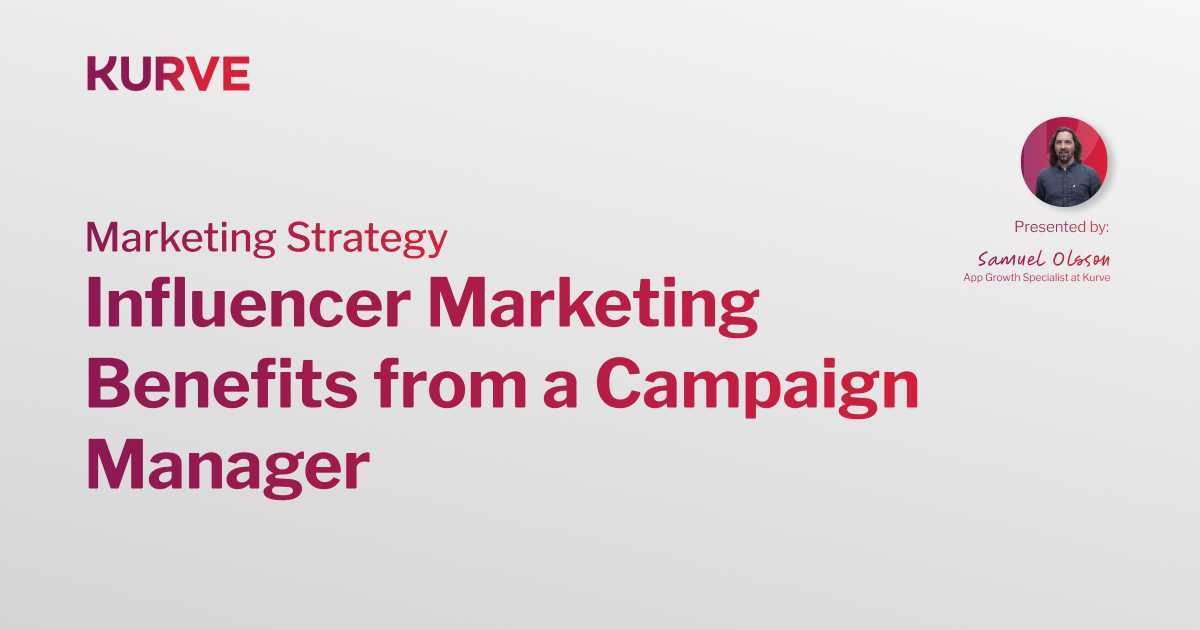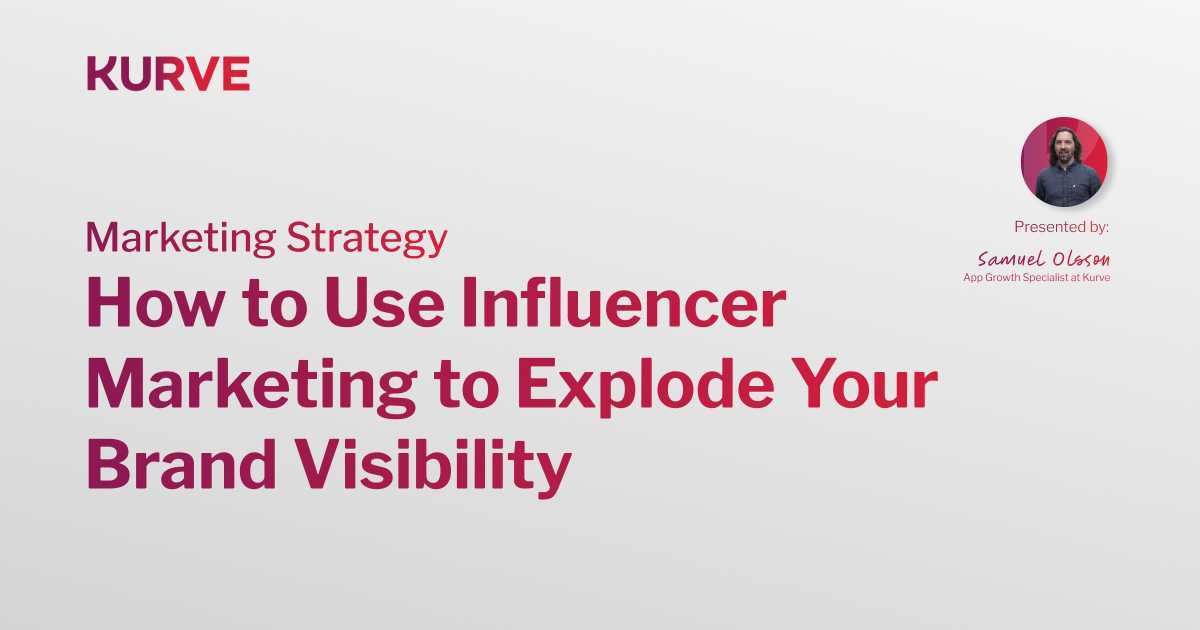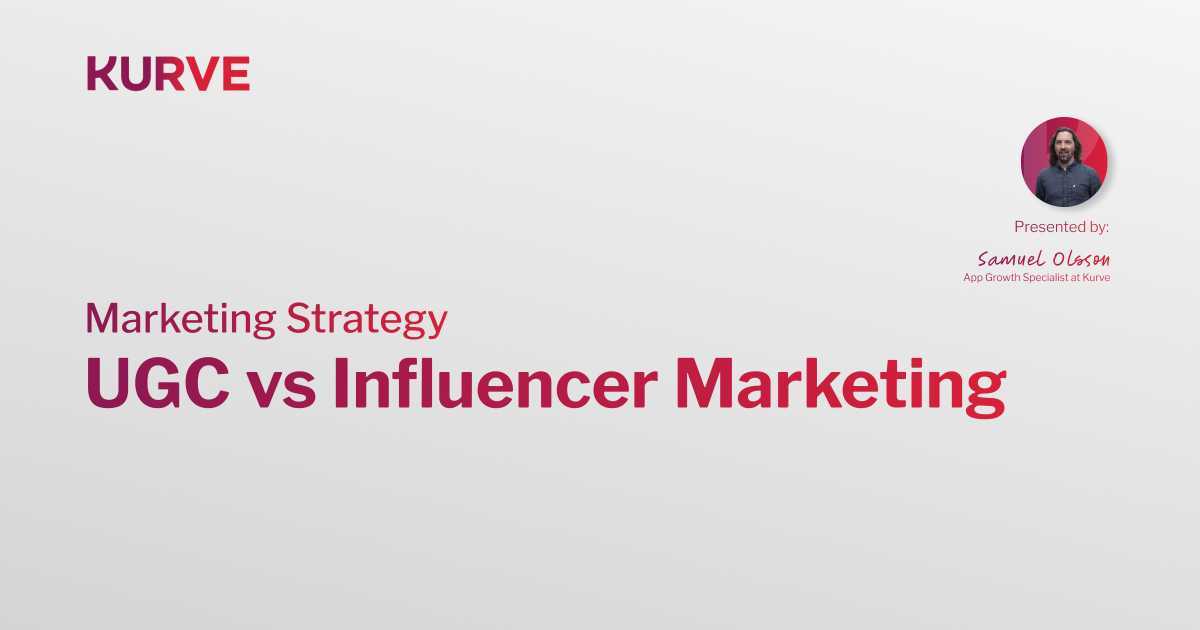The 3 Best Mobile App Marketing Strategies for 2023
Are you struggling to navigate the cutthroat world of mobile apps?
We understand how tough it can be to leave a lasting impression. With the sheer amount of competition and the fast-paced, short-attention-span world of mobile devices, app marketing is increasingly challenging.
The answer lies in applying robust mobile app marketing strategies that make a substantial impact. Or, you can entrust the job to seasoned agencies like Kurve.
This strategy has proven successful, as seen in our collaboration with Packed, where we dramatically reduced their customer acquisition costs.
In this blog post, we'll guide you through the three best mobile app marketing strategies for 2023. Each will help you traverse every stage of the app marketing journey. Armed with these strategies, you'll have the tools to make your app shine brighter than ever.
Why is there a Need for A Mobile App Marketing Strategy?
The mobile app market is a battleground where thousands of apps compete for attention. A well-crafted mobile app marketing strategy is essential to rise above the noise.
This roadmap helps you identify your target audience, devise ways to reach them, and set the stage for your app's success.
It facilitates customer acquisition, retention, and monetization. It helps to identify market trends and competitor strategies, equipping you to make data-driven decisions. With a marketing strategy, you're making targeted efforts that optimize your resources and maximize returns.
App Marketing Stage: Awareness
Before diving into the best marketing strategies for your app, it's crucial to understand the initial stage - building awareness. This stage involves making your app known to potential users and sparking their interest. Here are some effective marketing tactics to navigate this stage and pave the way for your app's success.
Set the App Launch Date
Setting an app launch date is pivotal to your marketing strategy. It offers an absolute deadline to work towards and plan your activities around. This timeline assists in coordinating promotional efforts, press releases, and pre-launch campaigns. A defined launch date also helps generate buzz and anticipation amongst potential users. You can harness this to build a community of early adopters eager for your app's release. Consider your target market, industry trends, and significant events in planning for the most impactful launch.
Do Market Research
Market research forms the backbone of your mobile app marketing strategy. It equips you with the knowledge to better understand the market dynamics and customer expectations. It helps you determine what works, what doesn't, and the opportunities you can seize to make your app shine amongst the competition.
Market research also assists in identifying potential hurdles and preemptively formulating strategies to tackle them. Here are a few crucial aspects to focus on during your market research:
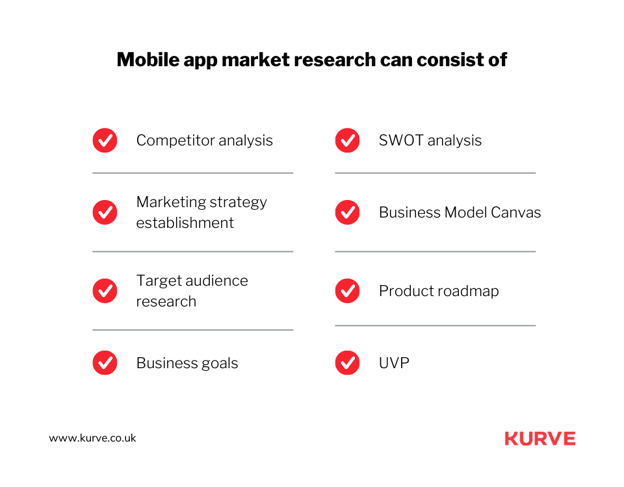
Identify the Target Audience
Understanding your target audience is a critical first step in market research. It involves knowing your potential users' demographics, preferences, behaviors, and the problems your app can solve. This information helps tailor your marketing messages with more specificity. This ensures your app resonates with those most likely to download and use it.
Create a User Persona
A user persona represents your ideal user. It's built on three key metrics; real user demographics, behavior data and educated speculation about their motivations, problems, and goals. Crafting user personas helps make your marketing strategies more targeted. The more targeted your efforts are, the more you enhance engagement and user acquisition.
Check the Market Trends
Staying abreast of the latest market trends can give your app a competitive edge. It allows you to understand the changes in customer preferences and technological advancements. This data allows you to tailor your app's features, design, and marketing strategy to meet users' evolving needs.
Make a Competitor Analysis
Understanding your competition is crucial. It helps you learn from their successes and avoid their mistakes. Analyze their features, marketing strategies, user reviews, and more. Knowing your competitors' strengths and weaknesses lets you position your app in the market and differentiate it.
Create an App Website
Creating an app website is a strategic step in establishing your app's online presence. It provides many benefits:
- It communicates detailed information about your app, including its features, benefits, and updates,
- It enhances your app's visibility on search engines, driving organic traffic,
- It acts as a hub for press releases, blogs, and other marketing efforts, fostering customer engagement and retention,
- It lends credibility to your app, building user trust.
To ensure your app is built with a strong foundation, consider leveraging app development services that focus on performance and scalability.
Build an App Landing Page
A dedicated app landing page serves as your potential users' first point of contact. It should showcase the value proposition of your app, its features, and its benefits. Use visuals, engaging copy, and social proof to drive conversions. Ensure to integrate clear and persuasive calls to action, directing visitors towards app download.
Create an Outreach Strategy
Outreach strategies are pivotal in extending your app's reach to potential users and stakeholders. An effective outreach plan comprises identifying the right platforms and strategies to communicate your app's value proposition.
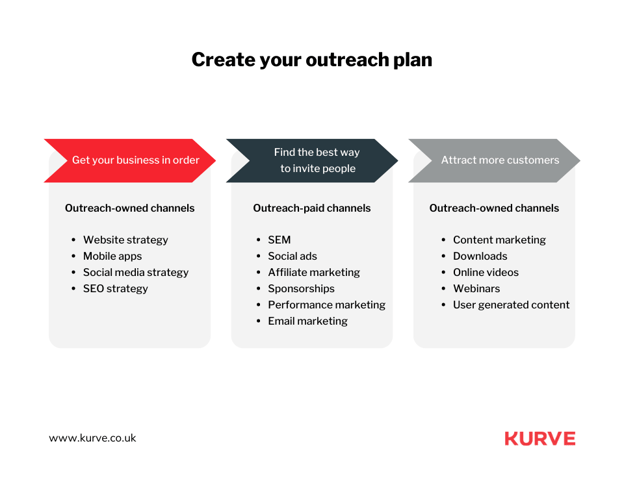
Kurve's successful outreach strategy with Sweatcoin exemplifies a winning approach. Our agency helped Sweatcoin become the fastest-growing health and fitness app. Such targeted outreach can drive brand awareness, user acquisition, and success.
Promote The App on Social Media Platforms
Utilize the potential of social media platforms to create engaging content and run targeted ads.
Social media allows you to connect with your audience, receive feedback, and build a community around your app, fostering loyalty.
Consider Influencer Marketing
Influencer marketing can boost your app's credibility and visibility. Collaborating with influencers who resonate with your target audience can generate buzz around your app. Their endorsements can instill trust in other app users and prompt downloads from their followers, boosting new user acquisition.
Consider Email Marketing
Email marketing remains a potent tool in your outreach strategy. It allows personalized communication with your prospects, fostering relationships. Use it for distributing newsletters, app updates, promotional offers, and more. Such consistent touchpoints can drive engagement and conversions.
Write Public Press Release
Public press releases help generate buzz and spread the word about your app. It communicates your app's launch, updates, or other significant events to a broad audience, including journalists, bloggers, and potential users. It can enhance your app's visibility, credibility, and user acquisition.
App Marketing Stage: Acquisition
The acquisition stage of mobile app marketing involves strategies and tactics to gain new users for your app. This stage leverages multiple channels to attract users, create awareness, and promote downloads.
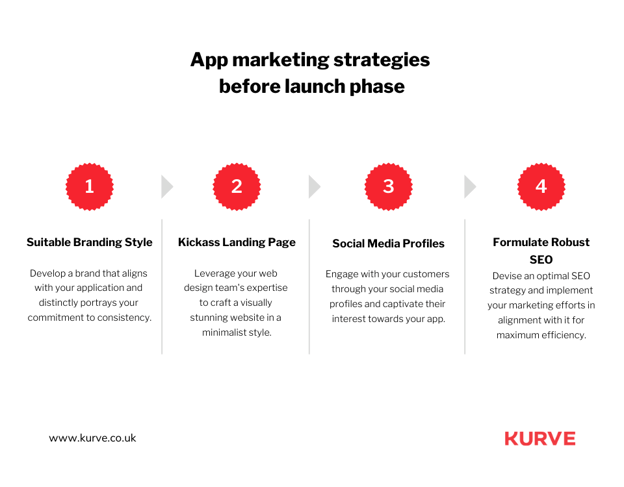
It's about strategically positioning your app where your potential users are. It also means providing them with compelling reasons to try it and making the download process seamless. This stage is pivotal. Acquiring high-quality users that engage with your app can drive its long-term success.
Here are some strategies for the acquisition stage.
Create an App Video
Creating an app video can convey your app's unique selling proposition effectively. It provides a dynamic preview of your app's functionality and aesthetics, creating a more engaging experience for potential users. A well-crafted video can increase download rates and positively impact your app and App Store ranking.
Offer Free Trials
Offering free trials can reduce the barriers to app adoption. Users get a first-hand experience of your app's value without any initial commitment, increasing the likelihood of downloads. Once users realize the app's importance during the free trial, they will likely become paying customers.
Encourage Users to Review the App
Positive app reviews enhance your app's credibility, encouraging more downloads. Facilitating easy review submission for users within the same app store is essential. Also, consider timely prompts to rate and review your app. These are especially effective after users have had a positive experience or reached a milestone within the app.
Prioritize App Store Optimization
App Store Optimization (ASO) is vital for improving your app's visibility on app store search results. It involves optimizing your app's title, keywords, screenshots, and description. A well-optimized app listing in search results can attract more organic traffic and increase download rates.
Consider Paid Ads
Paid ads can boost your app's visibility and download rates. Platforms like Google AdMob, Facebook Ads, and Apple Search Ads allow you to target specific user demographics and drive high-quality downloads. Keep track of your ad performance to optimize your ad spend.
Cross-Promote with an App Partner
Cross-promotion with a complementary app can drive user acquisition. Both parties can benefit from the partnership by recommending each other's apps. This strategy broadens your reach and introduces your app to a new, relevant user base, boosting app downloads further.
Pitch the App to App Store Editors
Getting your app featured by App Store editors can provide a significant boost in visibility and downloads. Craft a compelling pitch highlighting your app's unique features, benefits, and value proposition. A feature from App Store editors can lend credibility and exposure to your app.
Try Traditional Marketing
Pay attention to the power of traditional marketing channels. Billboards, radio, TV, and print ads can reach a broad audience and drive app awareness. Especially for localized apps, traditional marketing can provide good visibility and reinforce your digital marketing efforts.
App Marketing Stage: Retention
The retention stage of mobile app marketing focuses on keeping your acquired users engaged and active over time. It's about delivering consistent value and fostering a positive user experience. When you deliver on these components, you build a loyal user base. Retaining users is more cost-effective than acquiring new ones, increasing LTV. Effective retention strategies turn users into advocates for your app, driving organic growth.
Here are some strategies for the retention stage.
Smooth Out the Onboarding Process
An intuitive onboarding process enhances users' first impressions of your app. It should guide users through the app's basic features and demonstrate how to gain value from it. An effective onboarding process can reduce abandonment rates and foster long-term engagement.
Set a Referral System
A well-structured referral system incentivizes users to share your app with their network, promoting organic growth. By rewarding users for successful referrals, you encourage word-of-mouth marketing. This form of marketing is very impactful and credible.
Write Content Blogs/Guest Blogs
Regularly publishing relevant and informative blog content can enhance user engagement. It helps users get more value from your app and updates them on new features or use cases. Guest blogging on relevant platforms can also increase visibility and credibility.
Make Push Notifications when Appropriate
Push notifications can improve user retention when used judiciously. They can remind users about your app, update them on new features, or provide personalized recommendations. However, avoid excessive notifications, leading to annoyance and app uninstalls.
Integrate AI and Chatbots
AI and chatbots can provide personalized user experiences and streamline customer support. They can engage users with tailored content, answer queries promptly, and offer proactive assistance, enhancing user satisfaction and retention.
Make Personalization Features
Personalized experiences can make users feel valued and improve user engagement. Use user data to tailor individual users' content, recommendations, and experiences. Such personalization can boost user loyalty and promote long-term usage.
Carry Out A/B Testing
A/B testing allows you to experiment with different app elements to see what works best for your users. Testing and refining your app based on user feedback ensures an optimized user experience. When users feel the app meets their needs, you can foster retention.
Set Success Metrics
Establishing success metrics is critical for tracking your retention efforts. Key performance indicators include active users, session length, churn rate, and customer lifetime value. Monitoring these metrics helps you understand what's working and where improvements are needed.
Final ThoughtsA comprehensive marketing strategy is paramount in the hyper-competitive mobile app market. Our in-depth guide will ensure your plan spans the Awareness, Acquisition and Retention stages. From setting your launch date to running A/B tests for constant optimization, each step helps your app to stand out, attract, and keep valuable users.
Remember, the journey doesn't end with acquiring users. Keeping them engaged and loyal to your app is equally essential.
This process may seem daunting. But success is within reach with the proper guidance and support. For expert assistance and tailored app marketing strategies, get in touch with Kurve today. We're here to help you navigate the app marketing landscape with ease.
